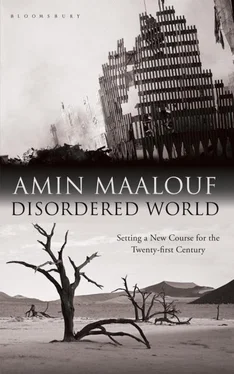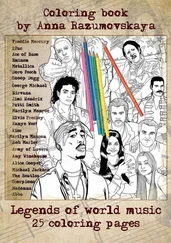Will the Arabs soon be in a similar position, thanks to the renaissance which began in 2011? Will they be able to regain the world’s respect for themselves and also for their civilisation? One can hope, though it will take time to restore an image which has been deteriorating for decades, or indeed centuries. As they had suffered defeat after defeat, everything that constituted their civilisation was looked down on by the rest of the world. Their language was disparaged, their literature little read, their faith aroused mistrust, the spiritual masters they venerate were ridiculed. They themselves felt within their very souls the scorn of others and in the end they internalised and adopted it. The destructive feeling of self-hatred spread within many of them. I have written ‘them’ but I could have written ‘us’; I feel myself an equal distance from both pronouns, just as near or far, and it may be that the additional tragedy of my people is reflected in this uncertainty.
There is no need to launch into ‘wild’ psychoanalysis to see that such as attitude gives rise to contradictory impulses: the desire to take it out on a cruel world and to do away with oneself; the desire to shed one’s identity and yet assert it before the world; a loss of confidence in one’s past, which one nonetheless clings on to because when one’s identity has been scorned, it represents a lifeline, a refuge and a place of asylum.
What is true of the past is also true of religion. Islam is a place of refuge for identity as well as dignity. The conviction that one belongs to the true faith and has been promised a better world, while westerners have gone astray, lessens the shame and hurt of being a pariah, a loser, eternally defeated in this world. Indeed, it was until the uprisings of 2011, perhaps the only one in which Muslims still had a sense of being blessed among nations, of being chosen by the Creator rather than cursed and rejected.
As the lot of the Arabs progressively deteriorated on the ground, and as their armies were beaten and their lands occupied, and as their people were persecuted and humiliated and their enemies behaved arrogantly as though they were all-powerful, the religion which they have given the world became the last refuge of their self-respect. To abandon it would be to renounce their main contribution to universal history; in a sense, it would be to renounce the very purpose of their existence.
As a result, the question which arose and still arises in Muslim societies in this age of pain is not so much about the relationship between religion and politics as between religion and history, religion and identity, and religion and dignity. The way in which religion is lived in Islamic countries reflects the historical dead end in which these people found themselves trapped until recently, and from which they are only just beginning to emerge; if they succeed in freeing themselves from depotism, subjugation and humiliation, they will find verses which accord with democracy, modernity, secularism, coexistence, the primacy of knowledge and the glorification of life; their relation to the scriptures would become less nit-picking, less sensitive and less rigid. Forgive me repeating once again: the problem does not lie in the texts; nor does the solution.
There is no doubt that since the beginning of the twenty-first century the Muslim world’s historical impasse has been one of the most obvious symptoms of the decline towards which a blindfold world seemed inevitably to be heading. Was it the fault of the Arabs, the Muslims, the way they live their religion? In part, yes. Is it not equally the fault of the West and the way it has for centuries managed its relations with other peoples? Yes, in part. And in the course of the past few decades, have the Americans and Israelis not borne a more specific responsibility? Probably. All these protagonists must radically change their behaviour if we are to see an end to a situation which starts from the open wound of the contemporary Middle East and is beginning to spread its gangrene to the whole planet, threatening to undermine all our civilisation’s achievements.
That is a statement of the obvious which sounds like a pious wish, but it cannot be dismissed with a shrug. Is it already too late to put in place a historical compromise which at the same time takes into account the tragedy of the Jewish people and of the Palestinians, the Muslim world, the Eastern Christians, and also the impasse that the West has got into?
Even when if the horizon seems dark and the protagonists’ demands seem irreconcilable, we must keep looking for traces of a solution.
One such, which could be promising, would be if the Jewish and Arab diasporas, instead of replicating the exhausting, sterile conflict which debilitates the Middle East, took the initiative to create a healthy rapprochement with the support of international diplomatic efforts.
Is it not much easier for an Arab and a Jew to meet and talk calmly, to share a meal and socialise, if they live in Paris, Rome, Glasgow, Barcelona, Chicago, Stockholm, São Paulo or Sydney, rather than in Beirut, Algiers, Jerusalem or Alexandria? In the wide world where diasporas coexist, couldn’t they sit down side by side, begin to forge links and reflect together on an alternative future for the people they hold dear in the Middle East?
That is happening already, one might reply. Perhaps, but much less than it ought to. On this crucial subject, I shall say what I have already said about several others: the question is not whether the Arabs and Jews talk to each other a bit more than they used to, or whether links are being made between people. The question is whether they will be able to resolve an endless conflict which is poisoning their lives and contributing to a disordered world.
The wish I have just expressed about the role of diasporas is linked to a wider hope that concerns all migrant populations, wherever they are, wherever they are from and whatever their history has been.
They all have powerful ties with two worlds at once, and they have authority to be communication channels, interfaces in both directions. If it is natural for a migrant to defend an attitude which comes from his home country in his new one, it should be just as natural for him to defend an attitude he acquired in his new country in his homeland.
It is sometimes said that if the Arab-Muslim immigrants of Europe formed a nation, it would be bigger than most member states of the EU, younger than all of them, and certainly the fastest-growing. What this overlooks is that if this population were an Eastern nation, it would not be negligible in terms of its size either, and it would be right at the top of the scale of all qualitative measures: its level of education, its spirit of enterprise, its experience of freedom, its active familiarity with the material and intellectual tools of modernity, its daily practice of coexistence, its ability to know widely varied cultures intimately, and so on. All of this gives these migrants a potential influence possessed by no other population in the East or the West.
It is an influence that they should exercise much more than they do — with confidence, pride and in both directions at once.
It is too readily forgotten that an immigrant is first of all an emigrant. This is not just a banal shade of meaning; the person really is double and lives as such. He belongs to two different societies, with a different status in each. Take the graduate who does a menial job in the city where he is an exile, yet who in the village he comes from may be a person of note. Or take the Moroccan worker who on the building sites in the North speaks only timidly with his eyes lowered, yet turns out to be a confident, voluble storyteller who makes expansive gestures when he is with his own people and is at last able to speak his language proudly. Or the Kenyan nurse who spends her nights in a suburban hospital and makes do with lukewarm soup and a piece of bread for her meals, but is revered in her home province because each month she sends back enough money to feed twelve family members.
Читать дальше












